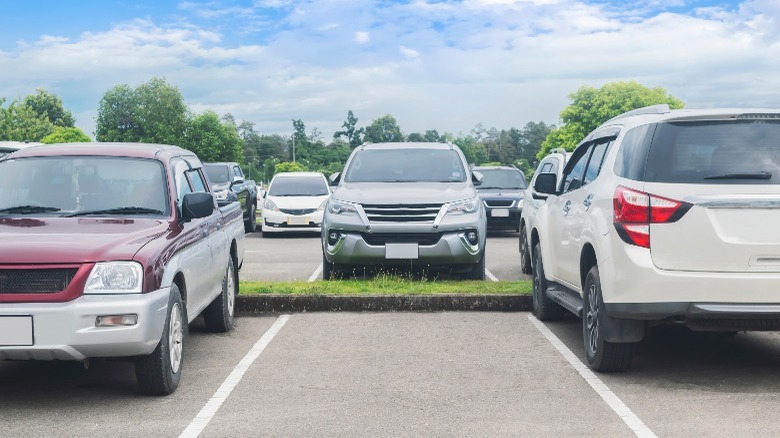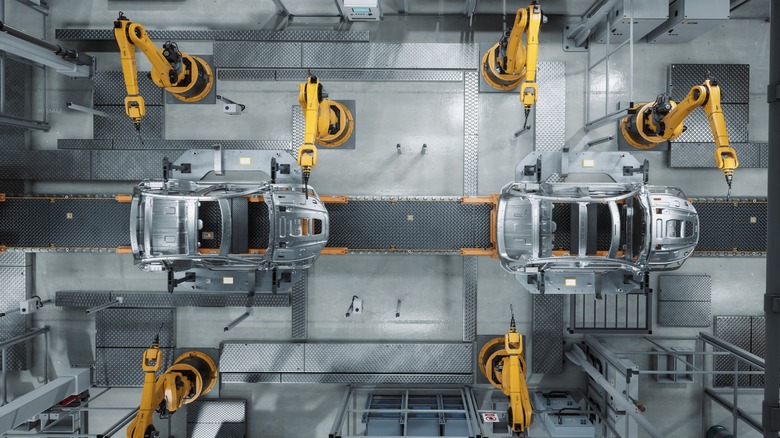Apple Car May Take Siri Commands To A Whole New Level
A mysterious patent filed to the United States Patents and Trademark Office on January 14, 2022, suggests that the long-rumored "Apple Car" could be manufactured with an onboard AI that can, apparently, read incoming signals and map those to autonomous driving commands. The first thing you might be thinking is that this means you can drive a car with your voice, which is technically possible if the patent holds water, but that's just scratching the surface of what it can do. According to the patent abstract, Apple describes the functionality of its tech as being able to "determine a path of a vehicle towards a particular stopping point" with respect to the signals given by an authorized individual, but this doesn't actually need to be the driver of the vehicle.
It's important to point out that an authorized individual could be anybody — even a traffic control operator, referred to in the document as a "navigation manager," whose job it is to wrangle all the self-driving cars into or out of a crowded area. The implications of such a technology going widespread might lead to vastly improved traffic management in otherwise crowded cities, such as Los Angeles, or for ease of transit into or out of crowded locations or events. One example of a use-case scenario shown by Apple is automated parking, which could theoretically save future Apple Car drivers a ton of time that they'd otherwise use circling around in search of a parking space.
Apple Car voice command patent details
The Apple Car patent goes on to explain the technical nitty-gritty of what its autonomous system can do, providing several other examples, referred to as "embodiments" of its patented tech. There's a lot of technical jargon buried in the document, but there are a few standouts. For example, there is a provision that describes that the system is equipped with cameras that can detect the biometrics of the individual sitting in the cockpit of the vehicle, and it can supposedly override control to that individual if a command is given to break away from exterior control. It sounds like there are also several safety mechanisms in place to ensure that this can be done without endangering the individual inside of the vehicle.
Such safety mechanisms are described in-depth by Apple, where it's claimed that "the navigation manager may select default criteria for selecting a stopping point ... in various situations the navigation manager may generate at least one backup plan (determined, for example, to achieve a minimum level of safety while also directed towards a stopping point associated with the destination) whenever guidance from an individual via intent signals is anticipated, so that a lack of input (or delayed input) from the individual does not lead to undesired consequences."
Apple describes that a remote signal can be sent to the autonomous vehicle from any sort of optical media, as well as any standard network, voice, or memory-based transmission.
What we know about Apple Car's production timeline
Overall, the fact that this patent exists fares well for the Apple Car hype cycle since it basically affirms that Apple hasn't stopped investing time in research and development of automobile products and/or services, following some internal shakeups that inspired doubt among Apple fans. However, it's still not entirely clear when we're going to hear more about a final release schedule for the Apple Car. According to MacRumors, apparently "hundreds" of Apple employees are now developing technology to make its admittedly complex autonomous vehicle road-safe. Apple has received a permit from the California Department of Motor Vehicles to move forward with its self-driving tests (so long as there is a pilot in the vehicle in case of emergencies).
But, as with many other car manufacturers, Apple is stymied by ongoing electronics chip shortages that have affected computer and car manufacturers worldwide. Without a doubt, such an advanced car will cost the company a pretty penny in semiconductor supplies, and it makes perfect sense that the ongoing shortages are putting downward pressure on the development of its autonomous vehicle and potentially other Apple products, including the next generation of Apple Watches and iPhones.
Regardless of when it ends up being released, it's likely that the premium cost for semiconductors is likely to place any Apple-made automotive squarely into luxury vehicle territory, including all costs associated with buying a high-end vehicle. But the sentiment remains that the Apple Car's navigation tech could pave the way for better traffic management — if it becomes affordable sometime in the future.


